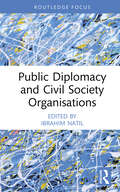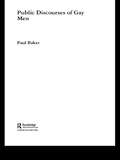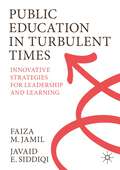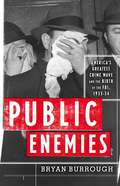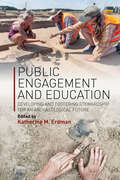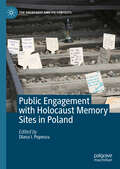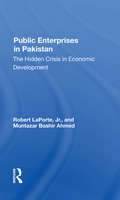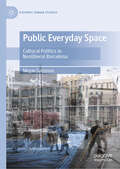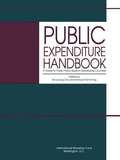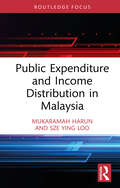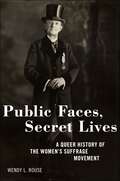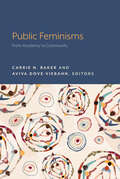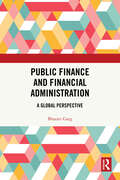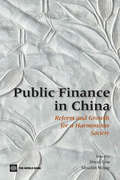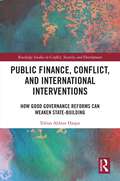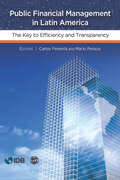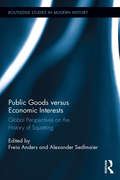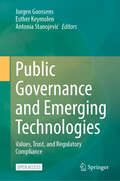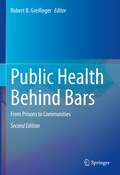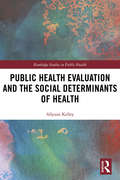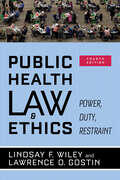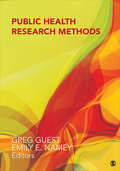- Table View
- List View
Public Diplomacy and Civil Society Organisations (Routledge Explorations in Development Studies)
by Ibrahim NatilThis book explores the roles of civil society organisations (CSOs) when engaging in public diplomacy activities and their impact on community development and change. It provides up-to-date analysis of the challenges and constraints facing CSOs involved in diplomatic missions and working with foreign donors. Bringing together case studies from Cameroon, Egypt, Poland, Palestine, Lebanon and Libya, this edited collection reflects on how external calls for proposals in the fields of women’s empowerment, community development, education, training, exchange programmes, democracy, human rights and peacebuilding influence the way civil society organisations contribute, deliver, intervene and position themselves in various societies. It explores the lessons learnt by various CSOs in identifying societal problems, understanding grassroots demands, prioritising development agendas and campaigning for peacebuilding. Grounded in a firm theoretical framework and based on up-to-date empirical research, the book reflects on the leadership shown by civil society organisations in development, politics and business and their impact on community development initiatives and local change process. This book will be an important resource for researchers, policymakers, donors, NGO practitioners and the beneficiaries themselves, within the areas of international development, peacebuilding, civil society, politics and international relations.
Public Discourses of Gay Men (Routledge Advances in Corpus Linguistics #Vol. 8)
by Paul BakerQueer linguistics has only recently developed as an area of study; however academic interest in this field is rapidly increasing. Despite its growing appeal, many books on ‘gay language’ focus on private conversation and small communities. As such, Public Discourses of Gay Men represents an important corrective, by investigating a variety of sources in the public domain. A broad range of material, including tabloid newspaper articles, political debates on homosexual law and erotic narratives are used in order to analyse the language surrounding homosexuality. Bringing together queer linguistics and corpus linguistics the text investigate how gay male identities are constructed in the public domain.
Public Economics
by Gareth D. MylesThis textbook provides a thorough treatment of all the central topics in public economics. Aimed at senior undergraduate and graduate students, it will also be invaluable to professional economists and to those teaching in the field. The book is entirely self-contained, giving all the equilibrium theory and welfare economics needed to understand the analyses. The author covers the Arrow-Debreu economy, welfare economics and the measurement of inequality and poverty which lay the foundations and emphasise the important role played by information. Within the competitive economy, he examines commodity taxation, income taxation and tax reform in a certain environment. He goes on to study the public economics of uncertainty, and then treats public goods, externalities, imperfect competition and tax evasion as departures from the standard competitive assumptions and looks at their implication for public economics derived.
Public Education in Turbulent Times: Innovative Strategies for Leadership and Learning
by Faiza M. Jamil Javaid E. SiddiqiPublic Education in Turbulent Times communicates a bold vision for the future of education, addressing the evolving purpose of American public education and the structural innovations schools are using to meet the needs of a rapidly transforming world. Highlighting key challenges that emerged during the immense economic and social disruptions of recent years, the book leverages case studies of four unique school districts where school communities overcame concerns high in the public consciousness – trauma, danger, economic inequality, and racial injustice. These obstacles have hampered efforts to reclaim lost learning opportunities that could define the educational experiences of a generation of students. If educators revert to business as usual, they risk dismissing essential lessons from resilient schools that thrived in the chaos of a global pandemic and its fallout. This book provides rich insights to refocus readers’ attention on achieving a more equitable and safe education system for the future.
Public Enemies: America's Greatest Crime Wave and the Birth of the FBI, 1933-34
by Bryan BurroughThe establishment of the FBI as a force against gang crime in the early 1930's.
Public Engagement and Education: Developing and Fostering Stewardship for an Archaeological Future
by Katherine M. ErdmanThe world’s collective archaeological heritage is threatened by war, development, poverty, climate change, and ignorance. To protect our collective past, archaeologists must involve the general public through interpersonal experiences that develop an interest in the field at a young age and foster that interest throughout a person’s life. Contributors to this volume share effective approaches for engaging and educating learners of all ages about archaeology and how one can encourage them to become stewards of the past. They offer applied examples that are not bound to specific geographies or cultures, but rather, are approaches that can be implemented almost anywhere.
Public Engagement with Holocaust Memory Sites in Poland (The Holocaust and its Contexts)
by Diana I. PopescuThis book aims to address a neglected field of research by providing evidence-based insights into how contemporary visitors of different national and generational background, especially those of Polish and Jewish descent, experience and reflect on their visits, or on living in the proximity of different sites of memory across Poland, including former concentration and death camps, ghetto sites, and other physical sites such as museums with a connection to the Holocaust.
Public Enterprises In Pakistan: The Hidden Crisis In Economic Development
by Robert Laporte Muntazar Bashir AhmedThis book contains a study of the economics and management of public enterprises in Pakistan. It examines their performance, organizational behavior, relationships with other government organizations outside of the sector, and the issues that confront the public enterprise sector and the government.
Public Everyday Space: Cultural Politics in Neoliberal Barcelona (Hispanic Urban Studies)
by Megan SaltzmanThis book explores how everyday practices in public space (sitting, playing, walking, etc.) challenge the increase of top-down control in the global city. Public Everyday Space focuses on post-Olympic Barcelona—a time of unprecedented levels of gentrification, branding, mass tourism, and immigration. Drawing from examples observed in public spaces (streets, plazas, sidewalks, and empty lots), as well as in cultural representation (film, photography, literature), this book exposes the quiet agency of those excluded from urban decision-making but who nonetheless find ways to carve out spatial autonomy for themselves. Absent from the map or postcard, the quicksilver spatial phenomena documented in this book can make us rethink our definitions of culture, politics, inclusion, legality, architecture, urban planning, and public space.
Public Expenditure Handbook
by Richard Hemming Ke-Young ChuA report from the International Monetary Fund.
Public Expenditure and Income Distribution in Malaysia (Routledge Contemporary Southeast Asia Series)
by Mukaramah Harun Sze Ying LooThis book studies the impact of public expenditure allocations in achieving income equality goals in Malaysia. The book examines the initial functional and institutional distribution of income across different institutional agents and sectors and evaluates the impact of the public expenditure policies in reducing the inter-ethnic and rural–urban disparity. Since Malaysia has made enormous progress in eliminating poverty, the authors suggest that a change of emphasis in the public expenditure policy may now be called for. They present evidence on the importance of public expenditure in improving income inequality and examine the initial functional and institutional distribution of income across different institutional agents and sectors. The development of the Social Accounting Matrix (SAM) model that presents both economic and social statistics in an economy can be served as a useful tool of this work. The SAM model is used to evaluate the impact of the public expenditure policies in reducing inter-ethnic and rural–urban disparity. A comprehensive source of information on how to deal with inequality economic challenges, the book will be of interest to economists and researchers on Southeast Asian Studies.
Public Faces, Secret Lives: A Queer History of the Women's Suffrage Movement
by Wendy L. RouseHonorable Mention for the 2023 Francis Richardson Keller-Sierra Prize2023 Judy Grahn Award-Publishing Triangle FinalistRestores queer suffragists to their rightful place in the history of the struggle for women’s right to voteThe women’s suffrage movement, much like many other civil rights movements, has an important and often unrecognized queer history. In Public Faces, Secret Lives Wendy L. Rouse reveals that, contrary to popular belief, the suffrage movement included a variety of individuals who represented a range of genders and sexualities. However, owing to the constant pressure to present a “respectable” public image, suffrage leaders publicly conformed to gendered views of ideal womanhood in order to make women’s suffrage more palatable to the public.Rouse argues that queer suffragists did take meaningful action to assert their identities and legacies by challenging traditional concepts of domesticity, family, space, and death in both subtly subversive and radically transformative ways. Queer suffragists also built lasting alliances and developed innovative strategies in order to protect their most intimate relationships, ones that were ultimately crucial to the success of the suffrage movement. Public Faces, Secret Lives is the first work to truly recenter queer figures in the women’s suffrage movement, highlighting their immense contributions as well as their numerous sacrifices.
Public Feminisms: From Academy to Community
by Carrie N. Baker Aviva Dove-ViebahnA city walking tour that subverts tourists’ assumptions about sex workers. Collaborative performances that offer participants a way to understand the stories of disappeared and murdered Indigenous women. Testimony before a state legislature on the harmful impact of parental consent laws for minors seeking abortion health care. A public film and discussion series encouraging intersectional feminist analysis. A Writing Center employing a Black feminist approach to teach writing to community members. These are just some of the stories told in this volume. Through art and public programming, activism and policy advocacy, public writing and community education, feminists in higher education are using scholarly methods and pedagogies to share academic knowledge and research with their communities at the local, national and international levels. These scholars are advancing public knowledge about issues affecting women and girls, racial and ethnic minorities, immigrants, Indigenous peoples, LGBTQAI individuals, and others facing discrimination, lacking resources, or experiencing economic, political and social injustices. This book offers a selection of case studies, models, narratives and tools from a diverse array of writers whose essays the editors have carefully curated to showcase myriad strategies for community engagement. Accessible and engaging to a broad range of readers, the essays in this volume are a rich resource for scholars interested in infusing their academic knowledge into the public sphere. This volume offers an opportunity to reflect on the meaning and importance of community engagement for scholars, and archives some of the important public-facing work feminists are doing today.
Public Feminisms: From Academy to Community
by Carrie N. Baker Aviva Dove-ViebahnThe field of feminist studies grew from the U.S. women’s movements of the 1960s and 1970s and has continued to be deeply connected to ongoing movements for social justice. As educational institutions are increasingly seeing public scholarship and community engagement as relevant and fruitful complements to traditional academic work, feminist scholars have much to offer in demonstrating different ways to inform and interact with various communities. In Public Feminisms: From Academy to Community edited by Carrie N. Baker and Aviva Dove-Viebahn, a diverse range of feminist scholar-activists write about the dynamic and varied methods they use to reach beyond the traditional academic classroom and scholarly journals to share their work with the public. Part one explores how feminist scholars engage broader audiences through art, media, and public programming, including essays on a public discussion series teaching intersectional feminist analysis of popular films, and a podcast from Latina scholars discussing issues of reproductive justice, social justice, motherhood, sexuality, race, and gender. Part two focuses on activism and public education, including essays on “Take Back the Night,” and archiving the women’s march protests. Part three turns to public writing and scholarship, including an essay on elevating the perspectives and voices of underrepresented creatives in the film and television industry. Part four explores feminist pedagogies for community engagement and for teaching public feminisms. Accessible and engaging to a broad range of readers, the essays in this volume are a rich resource for scholars and students interested in infusing their academic knowledge into the public sphere. With this timely book, the editors offer an opportunity to reflect on the meaning and importance of community engagement and highlight some of the important public-facing work feminist scholars are doing today. Faculty, graduate, and undergraduate students, as well as administrators hoping to increase their schools’ connections to the community, will find this volume indispensable.
Public Finance and Financial Administration: A Global Perspective
by Bharati GargThis book offers a comprehensive exploration of different aspects of public finance and its administrative practices across different countries. Based on a comprehensive review of existing literature, it combines theoretical exploration and practical case studies of developed and developing countries. Part I of this volume provides a basic understanding of the concept of public finance. Part II examines the role of budget with a detailed discussion of budgetary cycles in the U.S.A., Brazil, and India. It also provides an in-depth coverage of performance budgeting practices, focusing on the OECD countries. Part III focuses on intergovernmental federal fiscal relations with a special focus on India, along with the Ministries of Finance in the U.S.A., the U.K., and India. Part IV delves into audit systems and Supreme Audit Institutions, presenting case studies of France, Germany, the U.S.A., the U.K., and India. It also includes studies on the latest national and international reports to support the findings. This book will be useful to students, researchers, and teachers of Public Administration, Public Policy, Public Finance, Economics, and Management. It will also be an invaluable resource for professionals and policymakers, as it shall help strengthen their conceptual understanding of the subject.
Public Finance in China
by Jiwei Lou Shuilin WangSince 1980, China's economy has been the envy of the world. Is annual growth rate of more than 9 percent during this period makes China today the world's fourth-largest economy. And this sustained growth has reduced the poverty rate from 60 percent of the population to less than 10 percent. However, such rapid growth has also increased inequalities in income and access to basic services and stressed natural resources. The government seeks to resolve these and other issues by creating a 'harmonious society' -- shifting priorities from the overriding pursuit of growth to more balanced economic and social development. This volume compiles analyses and insights from high-level Chinese policy makers and prominent international scholars that address the changes needed in public finance for success in the government's new endeavor. It examines such key policy issues as public finance and the changing role of the state; fiscal reform and revenue and expenditure assignments; intergovernmental relations and fiscal transfers; and financing and delivery of basic public goods such as compulsory education, innovation, public health, and social protection. And it offers concrete recommendations for immediate policy changes and for China's future reform agenda. 'Public Finance in China' is a must-read for specialists in public finance and for those seeking an understanding of the complex and daunting challenges China is facing.
Public Finance, Conflict, and International Interventions: How Good Governance Reforms Can Weaken State-building (Routledge Studies in Conflict, Security and Development)
by Tobias Akhtar HaqueThis book provides a critical analysis of the political and conflict impacts of “good governance” public finance reforms, showing how unintended distributional outcomes can undermine broader state‑building goals.The international community expends enormous resources trying to build “good governance” institutions in countries emerging from war. By ensuring efficiency, increasing transparency, and enhancing public accountability in the use of public resources, the adoption of “good governance” institutions is assumed to support stability, peace, and sustainable economic growth. Such assumptions, however, have a limited empirical basis and obscure a more complex reality. Drawing from political science and institutional economics, and evidence from major state‑building interventions in Afghanistan, Timor‑Leste, and Solomon Islands, this book explores the impacts of technocratic “good governance” reforms in fragile environments. Through the lens of public finance reform, it illustrates how efforts to achieve efficiency and accountability, while often bringing important benefits, can also undercut the patronage channels that draw together powerful elites, thereby increasing conflict pressures and eroding prospects for sustainable peace. This book makes the case for a reconsideration of the “good governance” agenda and the appropriateness of its application in developing countries experiencing or at risk of war.This book will be of interest to students of state‑building, global governance, political economy, development studies, and International Relations.
Public Financial Management and Fiscal Outcomes in Sub-Saharan African Heavily-Indebted Poor Countries
by Tej Prakash Ezequiel CabezonA report from the International Monetary Fund.
Public Financial Management in Latin America: The Key To Efficiency And Transparency
by Carlos Pimenta, Mario PessoaA report from the International Monetary Fund.
Public Goods versus Economic Interests: Global Perspectives on the History of Squatting (Routledge Studies in Modern History)
by Alexander Sedlmaier Freia AndersSquatting is currently a global phenomenon. A concomitant of economic development and social conflict, squatting attracts public attention because – implicitly or explicitly – it questions property relations from the perspective of the basic human need for shelter. So far neglected by historical inquiry, squatters have played an important role in the history of urban development and social movements, not least by contributing to change in concepts of property and the distribution and utilization of urban space. An interdisciplinary circle of authors demonstrates how squatters have articulated their demands for participation in the housing market and public space in a whole range of contexts, and how this has brought them into conflict and/or cooperation with the authorities. The volume examines housing struggles and the occupation of buildings in the Global "North," but it is equally concerned with land acquisition and informal settlements in the Global "South." In the context of the former, squatting tends to be conceived as social practice and collective protest, whereas self-help strategies of the marginalized are more commonly associated with the southern hemisphere. This volume’s historical perspective, however, helps to overcome the north-south dualism in research on squatting.
Public Governance and Emerging Technologies: Values, Trust, and Regulatory Compliance
by Jurgen Goossens Esther Keymolen Antonia StanojevićThis open access book focuses on public governance’s increasing reliance on emerging digital technologies. ‘Disruptive’ or ‘emerging’ digital technologies, such as artificial intelligence and blockchain, are often portrayed as highly promising, with the potential to transform established societal, economic, or governmental practices. Unsurprisingly, public actors are therefore increasingly experimenting with the application of these emerging digital technologies in public governance. The first part of the book shows how automatization via algorithmic systems, the networked nature of distributed technologies such as blockchain, and data-driven use of AI in public governance can promote hyper-connectivity and hyper-complexity. This trend and the associated concerns have drawn societal, political, and scholarly attention to regulatory compliance considering the current and potential future uses of emerging technologies. Accordingly, the second part of the book focuses on regulatory compliance and regulatory solutions. It explores the compatibility of technology with existing regulations, existing legal tools that could be innovatively applied for the successful regulation of emerging technologies, and approaches to updating existing legislation or creating new legislation for the regulation of emerging technologies. While socio-ethical considerations on upholding public values in a digital world are at the heart of all chapters, the third part specifically focuses on public values and trust. It advances a conceptual, normative discussion, putting the spotlight on trust and other fundamental public values that should be safeguarded. The book shows that the success of using emerging technologies in public governance depends to a large extent on the choices made by key stakeholders in public administration, legislative and regulatory bodies, and tech companies. When using and regulating emerging technologies in public governance, it is crucial to uphold public values and comply with legislation in a way that prioritizes the citizen’s perspective. To this end, the book offers an interdisciplinary approach based on qualitative and conceptual research.
Public Health Behind Bars: From Prisons to Communities
by Robert B. GreifingerPublic Health Behind Bars From Prisons to Communities examines the burden of illness in the growing prison population, and analyzes the impact on public health as prisoners are released. This book makes a timely case for correctional health care that is humane for those incarcerated and beneficial to the communities they reenter.
Public Health Evaluation and the Social Determinants of Health
by Allyson KelleyCompelling evidence shows health disparities are the result of inequalities in income, education, limited access to medical care, substandard social environments, and poor economic conditions. This book introduces these social determinants of health (SDOH), discusses how they relate to public health programs, and explains how to design and evaluate interventions bearing them in mind. Arguing that many public health programs fail to be as effective as they could be, because they ignore the underlying causes of health disparities, this important reference gives concrete examples of how evaluations focusing on the social determinants of health can alleviate health inequalities, as well as step-by-step guidance to undertaking them. This resource blends current research, existing data, and participatory evaluation methods. It is designed for teachers, students, practitioners, and policymakers interested in public health programming and evaluation.
Public Health Law and Ethics: Power, Duty, Restraint
by Lawrence O. Gostin Lindsay F. WileyPublic Health Law and Ethics defines these fields for a new generation. This bold and updated edition probes how the Covid-19 pandemic has fundamentally changed the legal landscape for public health practice. Through incisive analysis of public health legislation, judicial opinions, and scholarly research, this accessible primer articulates the scope and limits of governmental powers and duties to protect the public's health, builds a case for why social justice must be prioritized as a core value of public health ethics, examines the role of the courts in striking down democratically enacted laws, and covers today’s most pressing health issues, such as chronic diseases, opioid overdoses, gun violence, disability rights, sexual and reproductive autonomy, and racial and gender equity. The book creates a framework for ensuring public health interventions are based on sound scientific evidence and consistent with ethical values, revealing complex answers to the essential question of what community members owe one another when it comes to health.
Public Health Research Methods
by Greg S. Guest Emily E. NameyPublic Health Research Methods, edited by Greg Guest and Emily Namey, provides a comprehensive foundation for planning, executing, and monitoring public health research of all types. The book goes beyond traditional epidemiologic research designs to cover state-of-the-art, technology-based approaches emerging in the new public health landscape. Written by experts in the field, each chapter includes a description of the research method covered, examples of its application in public health, clear instructions on how to execute the method, and a discussion of emerging issues and future directions. In addition, each chapter addresses the topic in the context of global health and health disparities. Such breadth provides readers with practical tools they can use in the field, as well as a current understanding of conceptual discussions. Illustrated with engaging case studies that enhance understanding of the concepts presented, Public Health Research Methods is a comprehensive, must-have reference ideal for researchers in all sectors—government, academia, and non-profit.
